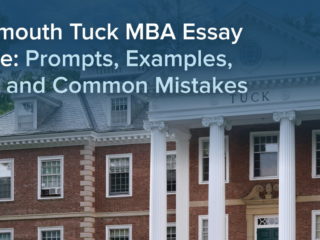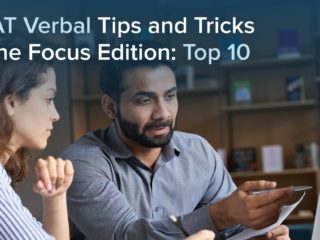| Getting your Trinity Audio player ready... |
Test-takers are generally aware that a lack of content knowledge can hold back their GMAT scores in the Verbal section. But, often, less attention is given to the detrimental impact that misguided strategies in answering questions can have. In fact, many GMAT students don’t realize they’re using misguided strategies when they answer Verbal practice questions, and those bad habits carry over to test day.
So, let’s take a look at what I consider the top 5 score-eroding errors test-takers make when tackling GMAT Verbal questions, along with some quick fixes. By the end of this article, you’ll see that, with some simple adjustments to your strategies and mindset, you can avoid these all-too-common GMAT pitfalls and improve your Verbal score.
Here are the 5 GMAT Verbal mistakes we’ll discuss:
- #1: You Guess Between Your Remaining Two Answer Choices
- #2: You Rush Through Reading the Question Stem
- #3: Your CR and RC Answer Selection Relies on Word-Matching
- #4: Your Reading Strategy Is Imbalanced
- #5: You Use Hacks Instead of Skill
- Key Takeaways
- What’s Next?
Get ready to increase your GMAT Verbal score!
#1: You Guess Between Your Remaining Two Answer Choices
For many test-takers, the biggest mistake they make on Verbal questions is guessing between their remaining two answer choices. Even if they’ve methodically eliminated answers and employed sound logic up to that point, they get frustrated. Maybe they think there is no real way to decide which choice is best. Maybe they just want to be done with the question. Whatever the rationale, they go with gut instinct to select a final answer.
The thing is, to get GMAT Verbal questions correct, we have to learn to decide between the last two choices. We could even say that the GMAT Verbal game is all about deciding between the last two choices. After all, there are generally three choices in a Verbal question that are relatively clearly incorrect. So, most of the hard work in answering a question comes in deciding between the remaining two choices.
We can’t rely on gut instinct to do the hardest work for us. If you were running a race, you wouldn’t stop 10 feet from the finish line and expect the wind to push you over it. When we’re down to two answers in a question, now is the time to really turn on our critical-thinking skills and higher-order logic, not go on auto-pilot.
So, what do we do instead?
Quick Fix: Expect the “Final Two” to Be Tough
A simple change of mindset can help us stay in the race when the finish line is in our sights. We must expect it to be hard to decide between our remaining two choices. Expect that part of answering the question to be the hardest part of all. If you take that view, then you’ll know that you’ll need to put in extra effort at the end of each Verbal question, rather than leave the final step up to fate.
TTP PRO TIP:
Expect deciding between your remaining two answer choices to be the hardest part of answering a GMAT Verbal question.
#2: You Rush Through Reading the Question Stem
Another big mistake that GMAT test-takers make when tackling the Verbal section is skimming, only half-reading, or rushing through reading questions. The thing is, it is very easy to commit this error. Why? Because through our GMAT Verbal study, we become very familiar with the question types. We see them again and again and learn to recognize them. Of course, this familiarity and recognition is a good thing. However, over time, and particularly under the time pressure of a practice test or the stress of test day, a good thing can backfire.
How so? Well, we see questions that we think we recognize, but really we haven’t read the question stem carefully, and we’re mistaken about what we see. For example, the word “support” frequently appears in both Inference and Strengthen question stems. However, those two common question types ask for very different things. If we’re rushing through reading the stem, we can easily mistake one question type for the other and end up falling for a trap answer.
Luckily, there’s a simple fix.
Quick Fix: Read the Question Fully and Carefully
Do yourself a favor and always read each Verbal question stem fully and carefully. Remind yourself that you’re not really saving any time by rushing through the stem. Not reading the question carefully is only going to make answering it more difficult and time-consuming. Moreover, the GMAT question-writer set traps specifically for test-takers who don’t read questions carefully! Not reading questions carefully is a very common error, and the GMAT writers know that.
So, make sure that you fully read and understand each Verbal question you see. Even if you don’t normally rush through reading questions during practice, be aware that this situation can occur for any number of reasons on test day. Maybe you’re behind on the clock, so you start to cut corners however you can to catch up on time. Maybe the pressure of the day causes you to fall back on bad habits you thought you’d eliminated early in your test prep. Maybe you’re just nervous.
Understanding that rushing is a common problem–and a score-killing one–can help you cut it off at the pass.
TTP PRO TIP:
Rushing through reading the question doesn’t save time! Always read each Verbal question stem fully and carefully.
#3: Your CR and RC Answer Selection Relies on Word-Matching
GMAT Verbal question writers do their darndest to make incorrect answers attractive to test-takers and correct answers not so obvious. One way they can accomplish this feat is by using wording in incorrect Critical Reasoning and Reading Comprehension choices that matches the passage wording and switching up the wording in the correct choice.
Naturally, when answer choices look, on the surface, as if they say something the passage says, we’re drawn to them. We may even assume that a choice that isn’t related at all to what the passage says, or possibly what the question asks, must be related because it uses passage wording. And when a choice uses wording that doesn’t exactly match the wording in the passage, we may be less drawn to that choice.
Of course, the GMAT writers aren’t going to make things so easy for us that we can simply play a word-matching game to ace Critical Reasoning and Reading Comprehension. Think about it: would your reasoning or comprehension skills really be tested by such a game?
The truth is, you will not perform well in CR or RC by selecting answer choices on the basis of whether they include words that appear in the passage. In fact, you’re likely to fall for many trap choices.
So, how do we avoid taking the bait?
Quick Fix: Engage in Deeper-Level Analysis
We have to dig below the surface of CR and RC answer choices. We can’t stop at the words used. Rather, we must focus on the logic and meaning of what they say. For instance, an incorrect choice could mirror language from the passage but actually contradict what the passage says is true. If we stay at the surface level in evaluating such a choice, rather than think more deeply about what the choice actually says and how it logically relates to the passage, we won’t catch that error.
Additionally, we might not notice a choice that is correctly in line with what the passage says simply because that choice phrases the information differently.
However, if we make logic and meaning, instead of wording, the primary criteria for our evaluation of answer choices, we engage in the deeper-level analysis that is necessary for finding correct answers to CR and RC questions and avoiding traps.
TTP PRO TIP:
Put logic and meaning at the forefront of your evaluation of CR and RC answer choices.
#4: Your Reading Strategy Is Imbalanced
Many GMAT test-takers perform poorly in Reading Comprehension because their reading strategy is imbalanced. Specifically, they make one of two common mistakes: they either try to process every detail when they first read a passage or they don’t bother to read through the passage at all. Neither of these strategies is optimal for efficiently and accurately answering Reading Comprehension questions.
The first strategy, reading for detail, is both impractical and unnecessary. It’s impractical because 99.99% of us cannot remember every detail we read, and trying to is far too time-consuming. It’s unnecessary because we don’t know which details we’ll end up needing to answer questions and which will be unimportant.
The second strategy, going to the questions without reading through the passage, and then just scanning parts of the passage for relevant information as we face each question, is no better. Using this strategy, we essentially start from zero with each question, rather than start armed with knowledge about what the passage says and where in the passage different discussions can be found. So, we waste time randomly scanning the passage and rereading sentences to find relevant information or make connections between ideas.
It may seem counterintuitive, but skipping reading the passage generally adds time to our RC work. Unfortunately, the notion that reading the questions first saves time is one of the biggest misconceptions that GMAT test-takers have about RC questions.
TTP PRO TIP:
Both reading for detail and not reading the passage are inefficient RC strategies.
So, what’s the best way to approach our first read of a passage?
Quick Fix: Read First, for Basic Comprehension
In both of the cases described above, a better strategy is the following. First, read through an RC passage with the goal of basic, overall comprehension, noting where key details lie but not getting caught up in the details. Then, attack each question, returning to the passage as necessary for relevant details. This strategy is most efficient for a few reasons.
First, you don’t waste time trying to memorize or fully process details that you may not be asked about.
Second, you get a basic sense of where different discussions take place in the passage. So, you don’t waste time randomly searching the passage for various bits of information that questions ask about.
Finally, you’re able to much more quickly spot answer choices that are clearly incorrect because they don’t comport with what the passage says. In fact, you may find that there are times when you can almost instantaneously recognize that an answer choice is wrong because it makes absolutely no sense given what you just read in the passage.
Of course, if you haven’t read the passage, you won’t have the benefit of being able to narrow down your choices right off the bat.
TTP PRO TIP:
Read an RC passage with the goal of basic, overall comprehension, and then attack each question, returning to the passage as necessary for relevant details.
#5: You Use Hacks Instead of Skill
The final big GMAT mistake test-takers make when answering Verbal questions is using hacks instead of skill to find correct answers. In fact, we’ve already discussed one popular “hack”: word-matching. A couple of other very common (and, sadly, just as ineffective) hacks include:
- automatically eliminating CR answer choices that use “extreme” words such as “only,” “always,” or “none.”
- reading the first RC question associated with a passage before reading the passage itself
These so-called hacks, and others like them, are not a reliable route to finding correct answers to GMAT Verbal questions. Sure, it could be the case that a CR answer choice that uses the word “always” happens to be incorrect. And you could get an ace on 10 at the blackjack table.
Similarly, it could be that reading the first RC question before reading the passage slightly reduces the amount of time you spend answering that question. However, it’s likely that you’ll add back your “saved” time and then some on the questions that follow, since you will have read that passage specifically for the first question and not for overall understanding.
Ask yourself, do you want your Verbal score to hinge on half measures and strategies that work only occasionally? Or, do you want to be able to implement strategies that you know will work time after time, on question after question?
TTP PRO TIP:
“Hacks” are not a reliable path to a high Verbal score because they work only occasionally and sometimes do more harm than good.
Quick Fix: Realize That the GMAT Can’t Be Gamed
It’s understandable that GMAT students want to find shortcuts and hacks to make mastering the GMAT easier. But the sooner students realize that the GMAT can’t be gamed, the better off they are in their GMAT prep, because they can start doing the real work of building their GMAT Verbal skills.
GMAT writers don’t make answering Verbal questions as simple as memorizing a list of “bad” words or picking the shortest sentence out of a lineup. In general, we should be wary of GMAT Verbal “hacks” that don’t require any actual Verbal skill or knowledge — the things that the GMAT tests.
In general, gimmicky GMAT Verbal strategies may be able to take you from a very low Verbal score to a mediocre one. However, beyond that, these hacks are a gamble. So, don’t gamble with your GMAT score!
TTP PRO TIP:
Be wary of GMAT Verbal “hacks” that don’t require any actual Verbal skill or knowledge.
Key Takeaways
When answering Verbal questions, take care to avoid the following 5 GMAT mistakes:
- guessing between the remaining two answer choices
- rushing through reading the question stem
- relying on word-matching in RC and CR
- using an imbalanced reading strategy
- use hacks instead of skill
Eliminating these common GMAT mistakes from your Verbal strategies can help you avoid traps in Verbal questions and increase the number of questions you get correct, particularly questions of a higher difficulty level.
Remember, because the GMAT is an adaptive test, greater accuracy on questions allows you to see more difficult questions, and correctly answering more difficult questions allows you to substantially increase your Verbal score.
So, always keep in mind that content knowledge is just one piece of the puzzle when it comes to mastering GMAT Verbal. Without smart strategies for applying that knowledge when answering Verbal questions, a high Verbal score is likely to remain elusive.
What’s Next?
Check out our article with tips on how to avoid careless mistakes on the GMAT and improve your accuracy when answering GMAT questions.
You also may be interested in our answer to the common question, “How many mistakes can you make on the GMAT and still score 655?”



